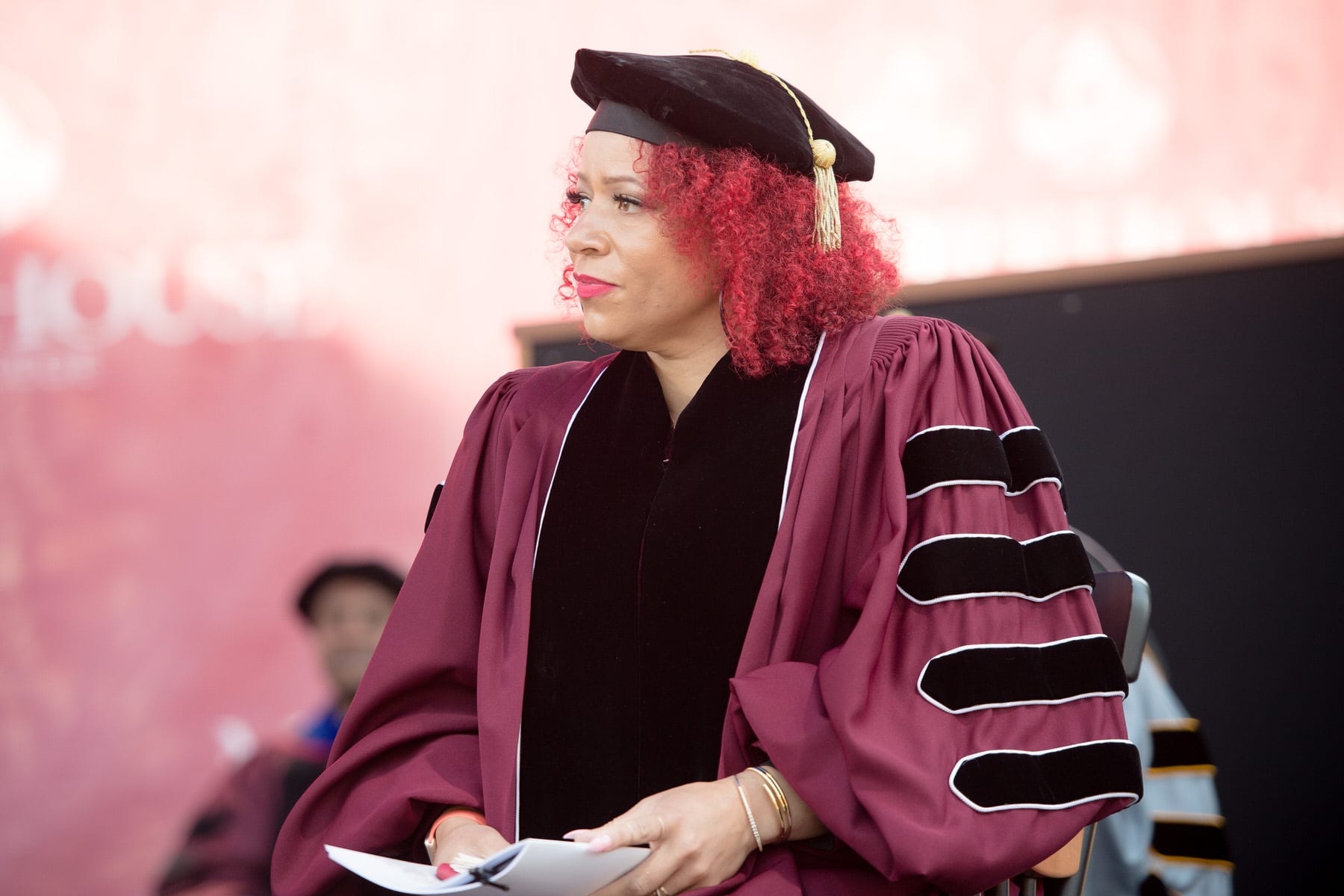The University of North Carolina at Chapel Hill’s board of trustees will again weigh whether to grant incoming professor Nikole Hannah-Jones tenure after an outcry over their decision to not give her the customary job protection, and whether it was related to her journalistic work reexamining how slavery shaped the United States’ founding.
The faculty committee that evaluates personnel and tenure matters resubmitted to the board this week its recommendation that Hannah-Jones receive tenure, the board’s chair has confirmed.
Though it is not clear what the board’s next steps will be — its next regular meeting is scheduled for mid-July — the clash at the school highlights how state university boards stacked with the political allies of the party in power are increasingly wading into battles over free speech, the right to protest and even basic facts, which mirror those playing out in legislatures.
The dynamic could shape who is recruited and retained by universities, and, along with that, the types of research, scholarship and lived experiences that inform academics and curricula — and even a school’s ability to remain accredited, experts said.
Lawyers representing Hannah-Jones on Thursday notified North Carolina lawmakers to preserve all documents and records related to the board’s decision that could be relevant to a potential legal claim, according to a letter obtained by the News & Observer.
“I think we’re seeing ever greater instances of these kinds of things happening,” said William Kirwan, a consultant for the Association of Governing Boards of Universities and Colleges and former chancellor of Maryland’s university system.
“It’s a reflection of the divisiveness in our country and how polarized we’ve come as a nation, and it is affecting board appointments.”
Kirwan said that while university campuses have long been in the culture war crosshairs, “the only instances I’m aware of where personnel decisions have been influenced by politics have been in Republican-dominated states.”
In 2018, 53 percent of the nation’s full-time professors were White men and 27 percent were White women; Latino men, Black men and Black women accounted for just 2 percent each, and less than 1 percent were Latina women, according to the National Center for Education Statistics.
In the same year, UNC had more than 600 tenured professors but fewer than 10 of them, like Hannah-Jones, were Black women, according to government data.
Hannah-Jones, who received a master’s degree from UNC Chapel Hill in 2003, was hired by the school earlier this year to be a professor in its Hussman School of Journalism and Media as a Knight Chair in Race and Investigative Journalism. The professorship, funded by the John S. and James L. Knight Foundation, has traditionally been a tenured position at the university.
Hannah-Jones is a MacArthur “genius” grantee who last year won a Pulitzer Prize for commentary for her work on the New York Times’ 1619 Project, a ground-breaking series of essays, poems, graphics and visual art pieces named for the 400th anniversary of the arrival of enslaved Africans.
Some historians praised the 1619 project for its review of how white supremacy shaped the nation; others said it offered a “new version” of U.S. history that was not entirely accurate. When the Pulitzer Center created related curricula for educators, Republican-controlled state legislatures moved to block its use in classrooms.
Most state university systems have governing bodies that are controlled, in some form, by governors and legislators who appoint and approve their members. The University of North Carolina System, for example, has a 24-member board of governors who are elected by the state legislature to four-year terms. There are 13 members on the board of trustees at UNC’s Chapel Hill campus: eight elected by the board of governors, four appointed by the legislature and the student body president.
States are increasingly operating under what is called a political “trifecta,” with one party controlling both chambers of the legislature and the governorship. There are currently 38 such states, with 23 in Republican control and 15 in Democratic control. In North Carolina, Republicans held trifecta control from 2013 to 2016, when it elected a Democratic governor. The legislature remains under Republican control.
During the trifecta period, North Carolina’s board of governors was “essentially purged of Democrats,” according to the Chronicle of Higher Education, and incoming board members included Republican big-ticket political donors, lobbyists and even a former lawmaker. Many are still in place due to staggered terms.
Typically, the tenure process at UNC Chapel Hill goes something like this: First, a candidate puts together their work, a curriculum vitae, and a personal statement; tenured professors from other universities evaluate the materials and write letters assessing a candidate’s strengths and weaknesses. Then, a committee of professors at the university’s hiring department reviews the outside letters, along with the underlying materials, and votes on whether to advance a candidate; a university-level committee of faculty from various departments then does the same. The candidate then advances to the provost, who nearly always sends the recommendation along to the board of trustees, which in turn nearly always approves the committee’s decision.
Mimi Chapman, a professor of social work who chairs UNC Chapel Hill’s Appointments, Promotion, and Tenure Committee, said the process for Hannah-Jones played out as expected until the last step, when it took a “highly unusual” turn.
“Then, we don’t know what happened, except that somehow she’s offered a fixed-term contract with the idea she could go up for tenure within five years,” Chapman said in an interview.
Chapman said the board’s handling of Hannah-Jones’ tenure has undercut the amount of work that faculty puts into making such a recommendation, and raises “a set of issues that are worrisome” and that “the longer lasting issue is: what message does this send to the rest of us?”
“If I’m a faculty member, I want to be at an institution that values my voice. It erodes who wants to be here and who wants to be here doing cutting-edge work. Some of my work has been around immigration, around implicit bias. These topics, are they all of a sudden off limits? Are they things we don’t allow people to study on our campus? Do we not talk about climate change? Research that involves stem cells?” she said.
A group of 1,619 UNC alumni on Wednesday took out a full-page ad in the News & Observer, the local paper, to add their “voices to the chorus of outrage of this politically-motivated decision” to bring on Hannah-Jones with a five-year contract instead of tenure.
The day before, more than 200 high-profile figures in media, sports and academia published a letter supporting Hannah-Jones on The Root saying “state institutions across the country are attempting to ban frank and rigorous conversation about our history in the classroom.”
Professors at UNC’s Hussman School of Journalism and Media last week said in a similar open letter that they were “stunned” by the board’s “departure from UNC’s traditional process” and that it “unfairly moves the goalposts and violates long-standing norms and established processes relating to tenure and promotion.” University faculty have urged the board to bring Hannah-Jones up for a tenure vote without delay. The Hussman dean, Susan King, along with other faculty, wrote to Hannah-Jones urging her to still join the school while they await a decision.
Hannah-Jones has declined to comment on the matter.
Kirwan said the UNC board’s actions could “compromise the ability of the institution to recruit in the future — serious academics do not want to be associated with a university where governance decisions are influenced by current politics.”
“I think the risk that an institution faces, when something like this happens, is to their ability to recruit and retain high-quality faculty and students who will be turned off by the impression, the sense, the reality, of political influence in academic decision making,” he added.





